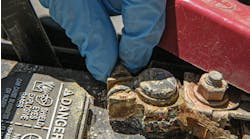I ran a shop for more than 25 years. We served good coffee. But as coffee prices would rise, I sometimes wondered if it was worth it. Maybe we should have provided cheaper, less strong coffee? I never did any of that.
Some years we had an abundance of cash and other years the Christmas bonus was not what I would have liked. The question was, “How much do I give away?”
When modern, plug-in electric vehicles (EVs) went on sale nationwide in December 2010 — other than Tesla and the California experiment of the 1990s — you could buy a Chevy Volt or a Nissan Leaf.
One was an EV with a gas engine as a backup and the other a pure electric car. My company, Automotive Career Development Center (ACDC), bought both.
Slowly, technicians from all over the world would come to Worcester, Mass., where ACDC is located, to learn about these two models. Early on, most shops where these techs worked installed level II destination chargers, with 240 volts supplying about 16 amps, adding 10 miles of range per hour.
At 20 cents per kilowatt delivered to their shops, the average EV charge that took an hour or two would cost about a buck. A cup of good coffee with cream and sugar costs about the same. So does a cheap pen, two for a dollar, with your name on it. You get the point here.
I have been writing for MTD for well over a year and the interest in this column has been very good. Why? To make good decisions, you need information.
Facts are the basis for all future planning.
When I did a class on management last year, I refreshed the definition of “What is the business owner’s function?”
I decided that in any business, the final decision-maker's job is to “make stuff up and be right most of the time.”
It got a laugh, but I think it also fits these times, when EVs are disrupting the usual slow-moving pace of technology used in motor vehicles.
The original equipment car manufacturers have invested billions of dollars in EVs and they want that investment to pay off. You are no different, but your investment is a lot lower.
If you already have a Level II or DC fast charger at your shop, you are ahead of the curve.
If you can spare five minutes, email me using the contact information at the bottom of this column with what you have learned about this subject. I am always learning.
If you want to consider offering EV charging at your dealership, here are a few things to know.
The product you are buying — both level I (120 volts AC) and level II (240 volts AC) — are technically called electric vehicle supply equipment (EVSE).
These chargers supply alternating current electricity and the battery in the car produces direct current (DC) electricity. In between the EVSE and the vehicle is a charger, located in the vehicle, to change AC to DC.
EVSE is commonly called a “charging station.” EVSE systems at the level II size come in different current outputs, shown as “amps” on the product description.
Simply put, provide more amps and the customer’s vehicle will charge faster.
EVSE equipment can also be classified as a DC Fast Charger (400 to 800 volts DC). That type is expensive and requires more power to operate than most shops have onsite.
As you consider offering EV charging at your dealership, here are some questions to ponder:
- Is there convenient charging close to your shop? If so, you may not need to do anything.
- Do you want to offer charging for free, as a courtesy? Some shops do.
- If charging is free, will you shut it off when you are closed? Some shops do that, but it may backfire and annoy people.
- Will this just be for your customers or will it be for the general public?
- Do you think this will attract new customers?
- How fast do you need to charge a vehicle?
- Do you have extra power in your fuse box to handle it?
- Can you afford to tie up a parking spot or two?
In addition, is there some money available from your city, state, federal government, utility provider or another entity to help fund it? This web site will help answer that question. Click on your state. https://afdc.energy.gov/fuels/electricity.html
Also remember that there are indoor and outdoor charging units and they can come with credit card readers.
If you work on plug-in vehicles, your techs will need the EVSE inside the shop to test vehicles that are not charging properly. (Level I is always portable. Level II can be portable.)
Contrary to what you may have recently read, EV sales are still very good. Taking the long view has helped my companies always stay ahead of the competition. Will your investments in EVs pay off? Only you can answer that question. I am here to help you arrive at an answer. It’s your answer — not mine.



